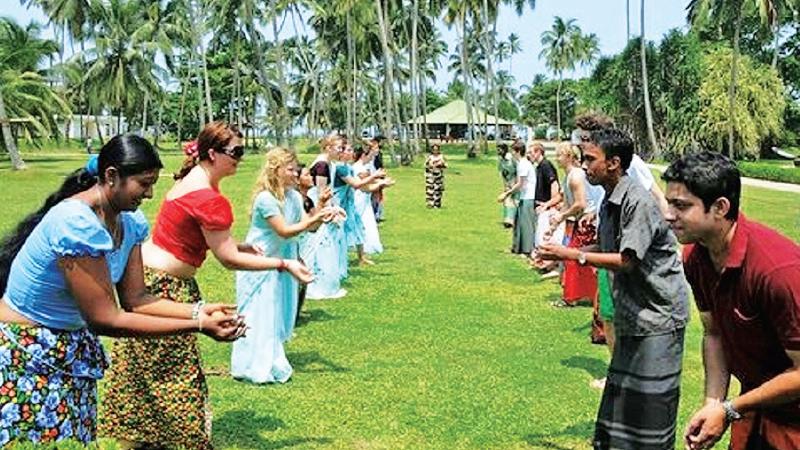
The Aluth Avurudda was a period of joy and happiness. All were happy – smiling, laughing, singing and joyfully intermingling. This pleasant experience gives us something to think about. Why cannot we continue this wonderful sense of happiness throughout the year?
The popular digital-age guru, Deepak Chopra says, “Happiness is no coincidence. Whether or not you are happy depends decisively on you. Because you can create happiness! Everyday. As much as you want!”
Happiness is usually situational, he says, and can be learnt, like riding a bicycle or a horse. Being happy is a skill anyone can acquire, and, that’s good news.
Pursuit of happiness
The question is, how can we acquire this special skill? Let’s start from the beginning. There is one chase in which we are all united, despite race, religion or politics. That is - the pursuit of happiness. We know it’s intangible, impermanent and elusive, but we wouldn’t mind. We know that experts, gurus, economists, psychologists, politicians and your next-door neighbour have different interpretations of what it is, but we don’t mind.
In the United States Declaration of Independence, “Life, Liberty and the pursuit of happiness” is a well-known phrase. The Americans believe that the pursuit of happiness is an ‘unalienable right’ of a citizen.
Recent research has found that genes control half the personality traits that make people happy, while factors such as, relationships, health and careers are responsible for the rest of our well-being. That means, we can inherit those personality traits. And, that’s also good news!
The chase for happiness was there in the past and continues today. But, what really is this sensation called happiness? Is it smelling roses (personal) or donating wheelchairs (public)? Does it come from within or from external cues? Responses to these questions range from the simple to the philosophical.
First, let’s settle an old debate. Does money bring happiness? The answer, however, begins with the theory known as the Easterlin paradox. In 1974, Richard Easterlin, an economist, argued that economic growth didn’t necessarily lead to personal satisfaction. As proof, he quoted the result of a poll carried out in post-World War II Japan. Between 1950 and 1970, Japan saw an unprecedented boom in economy. But, the percentage of people who claimed life satisfaction fell during this period. The Japanese, it seemed, were wealthier, but not happier.
Easterlin says, once basic necessities were met, additional income wouldn’t make you proportionately happier. He explains that above the ‘necessities’ mark, wealth sinks into a comparison pool. You own a Huawei Nova 3i (64 GB) phone and now you want an iPhone 7 (128 GB). And six months later you wish for an iPhone X (256 GB). This theory became an instant classic. Money can’t buy happiness.
Critical balance
However, economists now argue that money does bring some happiness. There may be no guarantees, but, in the 60 years since the Easterlin paradox hit the world, public opinion surveys have shown that ‘income does matter.’ They cite research tests to confirm that life satisfaction is highest in the richest countries.
However, affluence by itself does not guarantee a sense of well-being. The high incidence of heart disease and diabetes are results of affluence as much as they are of faulty living habits. Things that make us really happy, such as, time spent with kids, an evening with a life-long friend, a book or a film that brings joy, have nothing to do with a fat wallet.
Of course, you need cash to travel, for better health amenities, for leisure, for a better life. But happiness can still remain elusive. Does it mean happiness is connected with contentment?
Contentment is a mental or emotional state of satisfaction, may be drawn from being at ease in one’s situation, body and mind. Colloquially speaking, contentment could be a state of having accepted one’s situation and is a milder and more tentative form of happiness.
Contentment and the pursuit of happiness is a central thread through many philosophical or religious schools across diverse cultures. Siddhartha Gautama said, “Health is the most precious gain and contentment the greatest wealth”. John Stuart Mill, centuries later, wrote, “I have learned to seek my happiness by limiting my desires, rather than in attempting to satisfy them.” Hebrews 13:5 reads, “Keep your lives free from the love of money and be content with what you have.
All philosophers agree that contentment is a state ideally reached through being happy with what a person has, as opposed to achieving one’s larger ambitions, as Socrates described as, “He who is not contented with what he has, would not be contented with what he would like to have.”
There may be a number of elements of achievement that may make finding a state of personal contentment easier, such as: a strong family unit, a strong local community, and satisfaction of life’s basic needs, perhaps as expressed in Maslow’s hierarchy of needs. In general, the more needs in Maslow’s hierarchy are achieved, the more easily one might achieve contentment.
Do you know that the word happiness is derived from the Norse word hap, meaning luck or chance; the phrase happy-go-lucky illustrates the association. Gluck in German can be translated as either happiness or chance, while eftihia, the Greek word for happiness, is derived from ef, meaning good, and tixi, luck or chance.
But contentment is derived from the Latin word contentus and usually translated as satisfied. There are no multiple meanings here to confuse us.
We Sri Lankans may have a lot to be happy about. I, for one, choose the joy of contentment because it has the potential to serve as a foundation of happiness.
